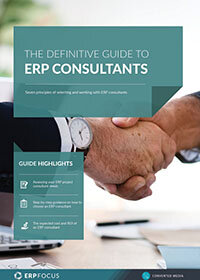Your complete guide to ERP consultants
Most of us employ one or more consultants to assist us with our ERP selection and implementation. We are good at what we do in our business, but we feel the need for additional expertise when it comes to ERP - after all, we don’t implement a new ERP every day.
ERP consultants all have their own unique advantages. Some are sole practitioners and others work for major worldwide consulting businesses. Some specialize in ERP only and others have more generalized practices that include ERP. There is no one category that they all fit within. What kind of consultant you should employ, and whether you should even employ a consultant, begins with the requirements you have for ERP and the goals of your business for that ERP system.
Hiring an ERP selection consultant
Selecting an ERP that will meet the requirements of your business is critical and there are many ERPs to choose from. A good consultant should have an unbiased view toward available ERP systems and help you find the system that will best satisfy your requirements. The consultant will also work with you to develop the best list of requirements. They will have a big-picture perspective and should steer you away from a requirement that might not optimize your future. The consultant has experience working with many businesses and likely can identify requirements that you would overlook simply because of their significant experience.
Hiring an ERP implementation consultant
An ERP implementation consultant can greatly improve your project success. Implementation of any ERP is a significant adventure that can take many months to complete. Implementing an ERP is a journey most businesses only take every decade or so and most of have little valuable experience. ERP implementation consultants do this for a living and many are very good at their work. Your consultant knows the many steps involved and in what sequence those steps must be taken.
They will begin with an overall plan that details the necessary steps for your particular implementation. They expand the overall plan into unique steps and milestones. An implementation consultant will have a proven methodology that will lead to successful implementations without inadvertently missing any critical steps.
Data conversion consultants
There must be a data conversion plan. You have existing data from a legacy ERP or from a variety of other sources. The consultant will examine that data noting the formats of the data and the quantity of the data or how many periods of data exist. Each field within the data tables is noted so those fields can be mapped into the new ERP’s data tables. The consultant will help decide on the amount of historical data that should be imported. Too much data can choke the new ERP before it is used, but too little means people must look to multiple systems when historical data is needed.
The consultant will determine the correct sequence to import data so that the new tables are filled and the ERP rules for data validity are met. Data will be imported several times over as testing ensues. Data will be imported one last time at the go-live date for the new ERP.
Data conversion and importing requires specialized knowledge. This consultant should have expertise in determining the correct static and dynamic data needed and how to quickly process the final import at go-live with no errors in the shortest possible time in order to reduce the time a business has no working ERP to the minimum.
Testing consultants
Testing your new ERP is a key part of ERP implementation. Testing begins with simple transactions such as receiving a purchase order or printing a packing slip for a customer shipment. As testing proceeds, we expand the tests to include a series of transactions that might be to prepare a purchase order and pass it through an approval cycle then processing the receipt of that order and placing the item purchased into inventory. Final tests are usually “order to cash” where we receive an order from a customer and move through every step culminating in the receipt of the payment from that customer.
A consultant is often used here because these tests are deceptively simple and an outside perspective is useful. When a test passes, we mark it as green. When the test fails, we determine why, make corrections, and test again. In this case, we mark the test as yellow when we understand the reason and red when this failure can jeopardize the entire ERP implementation.
What causes a failure of any test? It can be simply correcting one of the configuration settings; we set it incorrectly or did not understand how to make one setting in relation to another configuration setting. A test can also fail because the data we imported has some problem. Here, we need to correct that problem and update our data import process to ensure that problem will not cause any further failures.
We often find that making one correction fixes a particular issue and later we discover that the correction we made caused another test to fail. We must repeat the tests frequently to capture those hidden failures. Consultants have expertise in this infrequently needed skill and are experts in the use of testing software. Software can robotically repeat tests continuously well beyond the endurance level of humans.
Training consultants
Training the users of a new ERP is critical and expertise in training is an important specialty. Training consultants understand the use of ERP and can lead new users. More importantly, they embody an understanding of how people learn. Training consultants will recognize a visual learner and might simply show a printed flow chart to that person. Another person learns tactually and the trainer will ask that user to use their own hands to step through the necessary training on their own keyboard. Auditory learners can hear instructions in a classroom situation and retain that knowledge. All learners will need appropriate remedial training and some level of testing to ensure users are ready to perform their work using the new ERP.
There is a hierarchy of training too. All users will get basic instruction in moving from place to place in the ERP menu. Users will receive training in their own functional areas and should have training to expose them to the needs of users before and after their operations in every workflow.
Benefits of hiring an ERP consultant
When we hire an ERP consultant, we hire a person who can make sense of the complex. ERP is a comprehensive set of software tools used throughout our enterprise. Transactions made in one department will affect other department personnel and sometimes in unexpected ways. Configuration settings seem to make sense but we later find that one setting changed the behavior we expected because of another setting, perhaps in a different ERP module, which affected the behavior we wanted to set.
We want our ERP consultants to be objective. All of us have a bias toward our particular function within our organization. An ERP consultant should objectively lead us toward selection and implementation of ERP that will maximize the benefits for the enterprise even if some departments must live with a slightly suboptimal result, they should all benefit from improvements from the current situation.
When we hire an ERP consultant, we know we will spend money for that person and we expect that by spending a little, we will save a lot and greatly improve the return on our ERP investment.
Hiring an ERP consultant gives us the benefit of insights the consultant has earned through working with many selections and implementations in a wide variety of businesses. The consultant will share those insights and help us to achieve gains we might never see without the consultant’s background and experience.
Risks of hiring an ERP consultant
We must be cautious when hiring an ERP consultant. Some consultants represent a particular ERP product and might not have our interest as their first priority. To achieve the gains we want, we should not aim to maximize a consultant’s commission.
Avoid a consultant whose implementation strategy is too much a one-size-fits-all methodology. While our business might not be as unique as we think, it is uniquely our business. Our ERP consultant should have a proven methodology but we want it to have flexibility and agility so that the benefit to our business can be optimized.
Our ERP consultant will work closely with managers and users from every department for an extended period of time. We have a company culture from hiring people who share our values. When we hire an ERP consultant, we are looking for selection and implementation expertise, but we also must look for that fit within our company culture that we require of employees. An ERP implementation will last at least six months and often extends to more than two years. Our ERP consultant will be within our culture just as long. Be sure of the fit when hiring that person.
Conclusion
There is no reason we must hire an ERP consultant. If we have a person already on staff who has the background and we want that person to prove themselves through a complex and important project, this ERP project could be the perfect situation. Very often, though, all the possible people we currently employ have existing duties and we choose to hire a consultant for the ERP project and keep our current staff where they are. Many businesses have chosen their consultant so well they decided at the end of the ERP project to bring the consultant into the company as an employee. Others have completed their ERP project successfully and parted company with both parties satisfied. Whatever you choose, remember the most important factor is achieving your ERP system requirements and an ERP consultant might be a tool you should employ.
Free white paper

The definitive guide to ERP consultants
Seven principles of selecting and working with ERP consultants

Featured white papers
-

The definitive guide to ERP consultants
Seven principles of selecting and working with ERP consultants
Download
Related articles
-

Budgeting for an ERP consultant
How much can you expect to pay out for an ERP consultant?
-

How the right ERP can help you launch a successful omnichannel business
Petersen Zhu, CEO of DigitBridge and Vibes Base, shares how to create a scalable omnichannel stra...
-

A case study on finding the right ERP consultant
A fictional case study on the impact of hiring the right ERP consultant

